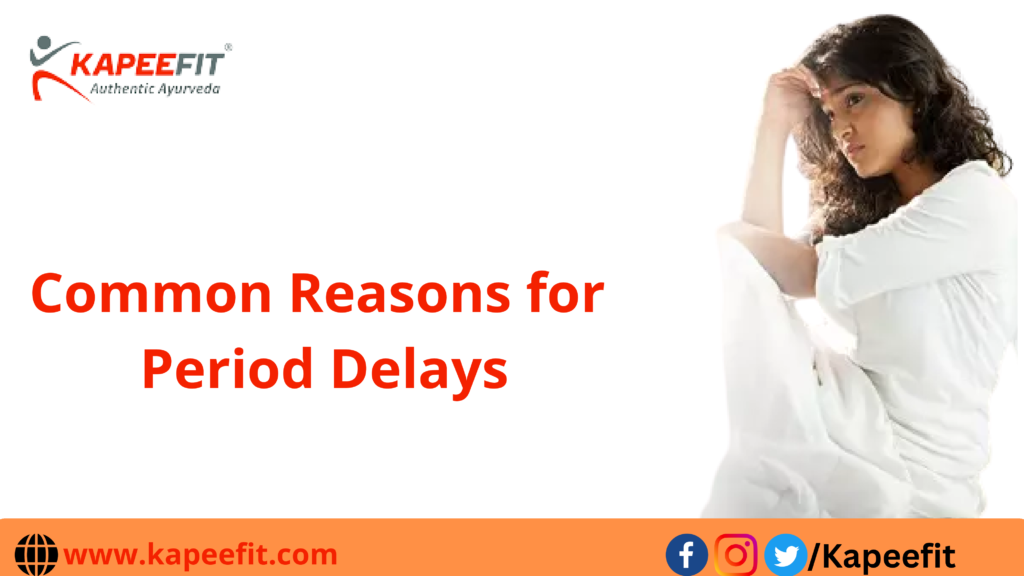Periods, or menstruation, is a natural monthly occurrence for women during their reproductive years. However, many women experience irregularities and delays in their menstrual cycle at some point.
Dealing with a missed or late period can be anxiety-inducing, but rest assured, there are numerous common causes for such delays. By gaining insights into these various reasons, you can find reassurance and better understand how Kapeefit online Ayurvedic consultation and natural treatments can offer effective solutions for your period-related concerns.
Normal Menstrual Cycle Variation
It’s important first to understand that menstrual cycles often vary naturally. The average cycle length is 28 days, but a normal cycle can range from 21 to 35 days. Ovulation typically occurs around day 14 in a 28-day cycle, but this too can vary by several days in either direction.
So if your cycle is usually regular but occasionally longer or shorter by a few days, this is likely normal physiological variation. No treatment is required. Monitoring your cycle over several months can help identify your natural cycle length and pattern.
Common Causes Of Period Delays
Here are some of the most common reasons for period delays that are typically not cause for concern:
Stress
Physical or emotional stress is perhaps the most common trigger for delayed menstruation. Stress causes changes in hormone production, particularly cortisol, that can disrupt the hypothalamic-pituitary-ovarian hormonal axis and delay ovulation.
Acute stressors like job loss or bereavement can delay periods. But so can chronic lower-grade stressors like busy work schedules, financial strain, or relationship issues. Managing and reducing stress through relaxation techniques, exercise, improved sleep habits, and support systems can help regulate the cycle.
Dieting and Low Body Weight
Extreme dieting, calorie restriction and low body weight often cause menstrual irregularities. A certain amount of body fat is needed to produce adequate estrogen and maintain hormone equilibrium. Drastic weight loss or low BMI can tip this balance and cause missed or infrequent periods.
Restoring a healthy diet and reaching a healthy weight can help re-regulate the menstrual cycle. See your doctor if diet/weight is causing severe menstrual disruption.
Birth Control Effects
Hormonal contraceptives like oral birth control pills can sometimes lead to unexpected bleeding between periods, especially during the first few months. This does not necessarily indicate a problem. The body is adjusting to synthetic hormone intake and withdrawal.
Likewise, intrauterine devices (IUDs) and other long-acting contraceptives may cause irregular spotting and altered cycle length, especially early on. This typically resolves with time as the body adjusts.
Perimenopause
As women approach menopause in their late 30s-40s, cycles often become irregular. Hormone levels fluctuate more, which can cause longer, shorter, lighter, or missed periods. Hot flashes, night sweats, vaginal dryness, and sleep disruption are other common perimenopausal symptoms.
See your doctor to discuss menopausal testing if irregular cycles persist for many months and you’re over age 45. They can check follicle-stimulating hormone (FSH) levels.
Breastfeeding/Postpartum
It’s normal not to get a period for several months after giving birth as the body recovers and breastfeeding inhibits ovulation. Establishing breastfeeding and room sharing can extend this period further.
As breastfeeding frequency decreases, cycles should resume within 9-18 months postpartum. See your OB-GYN if periods don’t return after 18 months.
Thyroid Issues
Thyroid hormones regulate metabolism and reproductive function. Both hyperthyroidism and hypothyroidism can lead to altered menstrual cycles. Other symptoms like fatigue, weight changes, and hair loss may also indicate a thyroid problem.
A simple TSH blood test can check thyroid function. Thyroid medication helps regulate hormone levels and usually restores normal menstruation.
Medications
Certain medications and drugs can affect hormone levels and inhibit ovulation, causing delayed or missed periods. These include antipsychotics, antidepressants, blood pressure and heart medications, hormones/steroids, and birth control.
Talk to your doctor if you suspect your medication is affecting your cycle. Lower doses or alternative options may be available. Don’t adjust medication dosage on your own.
Recent Pregnancy
It’s possible to have some bleeding during early pregnancy and mistake it for a light period. Similarly, in very early pregnancy, levels of the pregnancy hormone hCG may not yet be high enough to yield a positive test. This can make a missed period seem like a normal delay.
If you’ve recently had unprotected sex, test again with first-morning urine which has higher hCG content. See your doctor for evaluation.
Polycystic Ovarian Syndrome (PCOS)
PCOS is a common hormonal disorder affecting up to 10% of women. It causes ovulation problems, ovarian cysts, irregular or absent periods, and symptoms like excess hair growth, acne, and weight gain.
See your gynecologist if you suspect PCOS. Your doctor can check for cysts and high androgen levels. Treatment focuses on regulating cycles and managing symptoms.
Premature Ovarian Failure
In some women, the ovaries stop functioning normally before age 40. This premature ovarian failure leads to irregular periods which eventually cease years before typical menopause. It may be tied to genetics, autoimmune issues, or prior surgery/radiation. IVF with donor eggs may be needed to conceive.
Uterine or Cervical Factors
Structural abnormalities in the uterus or cervix can sometimes impede menstruation. These may include fibroids, polyps, scar tissue (Asherman’s syndrome), or cervical stenosis. Diagnostic imaging and operative hysteroscopy can evaluate and treat such abnormalities.

When to See a Doctor
- Irregular cycles persisting >3 months if previously regular
- No period by age 15 (primary amenorrhea)
- No period for >3 months (secondary amenorrhea)
- Periods suddenly stop before age 40
- Significant change in flow, pain, or duration
- Negative pregnancy test with missed period
Diagnostic Evaluation
- Medical history – menstrual pattern, sexual activity, contraception, medications, stress/weight changes, etc.
- Physical exam – abdominal, pelvic, and breast exam to check for masses or tenderness
- Pregnancy testing
- Pelvic ultrasound – evaluates ovaries and uterus
- Blood Tests – complete blood count, electrolytes, pregnancy, thyroid and hormone levels
Further testing like an endometrial biopsy, hysteroscopy, or laparoscopy may be warranted based on exam findings.
Treatment Options
Treatment depends on the underlying cause but may include:
- Hormonal contraceptives – Oral contraceptive pills, patches, and vaginal rings regulate menstrual cycles and relieve symptoms. The levonorgestrel IUD can reduce heavy bleeding.
- Metformin – Can help regulate cycles in PCOS by lowering testosterone and insulin resistance.
- Thyroid medication – Levothyroxine or antithyroid drugs regulate thyroid function.
- Surgery – Removal of uterine fibroids, polyps, or scar tissue that block menstruation.
- Fertility treatments – Ovulation induction, IVF, and donor eggs can help achieve pregnancy when needed.
- Alternative therapies – Acupuncture, supplements, and stress reduction help some women with menstrual irregularities.
- Hormone therapy – Estrogen/progestin therapy relieves menopausal symptoms and regulates cycles.
When to Worry
See your doctor promptly if you have:
- Pregnancy concerns – Take a pregnancy test
- Heavy bleeding – Could indicate fibroids, polyps, or clotting issues
- Severe pain – May signify endometriosis, cysts, adhesions
- Prolonged delay >3 months – Get evaluated for the underlying disorder
- Abnormal discharge – Have it checked for infection
Otherwise, give it a few months for stressors to resolve or your body to regulate. Keep a menstrual calendar to identify any persisting irregularities. Maintain a healthy lifestyle and get evaluated if normal cycles don’t resume.
Healthy Period Practices
- Eat a balanced diet with protein, fruits/veggies, calcium and omega-3s
- Exercise regularly – aim for 150 minutes per week
- Achieve/maintain a healthy BMI
- Reduce processed foods, sugar, and saturated fats
- Manage stress through yoga, meditation, counseling
- Limit alcohol and quit smoking – can disrupt cycles
- Stay hydrated and rest well
- Consider supplements like iron if heavy flows
- Avoid toxins from plastics, chemicals that disrupt hormones
When to Consult an Ayurvedic Doctor
Kapeefit online ayurvedic consultation for period problems offers natural solutions for menstrual problems focused on holistic healing. Consult an Ayurvedic practitioner if you have:
- Repeated irregular cycles
- Very heavy or painful periods
- Prolonged delays in menstruation
- Perimenopausal symptoms
Ayurvedic doctors assess your unique Vikruti (current imbalance) and recommend customized therapies for period regulation including:
- Herbs and formulas: Herbs like Shatavari, Ashoka, and Lodhra offer hormone balancing and uterine support. Formulas like Kumaryasava and Pushyanuga Churna promote regular menstruation.
- Yoga and meditation: Practices like Sarvangasana improve hormonal function. Transcendental meditation reduces stress.
- Panchakarma detox: Purification techniques like Vasti remove toxins and improve metabolism.
- Diet and lifestyle counseling: Food guidelines for your Dosha and women’s health are provided. A natural daily routine is advised.
- Marma therapy: Massaging energy points on the abdomen and feet regulates menstruation.
The benefits are holistic healing, improved ovarian and hormonal function, reduced pain, healthy cycles, and enhanced fertility.
Useful Herbs and Supplements
Here are some beneficial ayurvedic herbs and supplements for period regulation and women’s health:
- Shatavari – Supports the female reproductive system as an estrogen regulator and uterine tonic. Enhances fertility.
- Ashoka – Relieves menstrual problems like irregular cycles, pain, and heavy bleeding. Also aids female fertility.
- Lodhra – Styptic herb that stops excessive menstrual bleeding and discharges. Provides uterine support.
- Kapikacchu – Natural aphrodisiac that improves ovarian function and ovulation. Useful for PCOS.
- Guduchi – Powerful detoxifying herb that alleviates menstrual disorders and optimizes female health.
- Jeerakarishtam – Classical ayurvedic formula containing jeera that regularizes cycles, reduces pain, and improves flow.
- Ashwagandha – Adaptogenic herb that manages stress, modulates hormones and regulates menstrual cycles.
- Omega-3 fatty acids – help reduce menstrual cramps and normalize hormonal function.
Consult an ayurvedic doctor for a customized herbal regimen to address your specific period concerns. Practicing yoga, meditation, and a doshic diet will also provide holistic healing benefits.
When to Seek Medical Care
While most period delays are harmless, prompt medical evaluation is warranted if you have:
- Prolonged heavy bleeding causing anemia
- Severe pelvic pain or cramping
- Persistent irregular cycles > 6 months
- Signs of pregnancy with missed/delayed periods
- No period by age 16 or for > 6 months
- Unexplained weight loss or gain
See your family doctor or gynecologist in such cases for proper diagnosis and treatment. Have an annual well-woman exam for screening and evaluation.
Get urgent care for sudden severe pelvic pain which could indicate an ovarian cyst, torsion, or ectopic pregnancy requiring prompt intervention.
Conclusion
In summary, short-term fluctuations in menstrual cycle length are common and usually not concerning. Keep track of your periods and maintain a healthy lifestyle. Seek medical advice if irregular cycles become prolonged or you have other symptoms. For a natural approach aimed at holistic hormone balance and well-being, consult an Ayurvedic practitioner.
Also Read:
